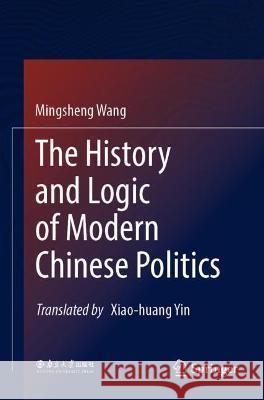The History and Logic of Modern Chinese Politics » książka
topmenu
The History and Logic of Modern Chinese Politics
ISBN-13: 9789811637186 / Angielski / Miękka / 2022
This book explores the history and development of modern Chinese politics. Written by Dr. Mingsheng Wang, a renowned Chinese political scientist, it presents a truly groundbreaking and thought-provoking study of the sociopolitical forces behind China’s gradual emergence as a new global power in the 20th century and its rapid rise as the world’s second-largest economy over the past 40 years. The author’s argument, illuminated by comparative theoretical analyses based on meticulously detailed empirical research, functions as a lens through which readers can better understand China’s remarkable accomplishments as well as consider broader issues that have perplexed many: Is there a China Path to sociopolitical progress? What is “socialism with Chinese characteristics”? Can China redefine its niche and maintain its growing momentum in an increasingly multilateral world? And finally, what lessons can we draw from China’s continuing progress in the post-COVID era?
As the author argues eloquently and with persuasive evidence, China’s ongoing progress has followed neither the mode of Russian-style socialism nor that of Western prototypical capitalism. Rather, it represents a distinctively different model of progress and a continuous search for a viable alternative route to modernity that is permeated with Chinese realities. By identifying an alternative system described as the “China Path,” the author demonstrates convincingly that there exist ample options for different types of modernity and that economic growth means not only industrialization, but also the development of political democratization and the realization of the rule of law. In this sense, this book significantly enriches our understanding of modern China. The 33 carefully selected essays in the anthology provide a much-needed opportunity for scholars, policy makers and all interested readers to obtain an insider’s view of the history and prospect of China’s political development.
As the author argues eloquently and with persuasive evidence, China’s ongoing progress has followed neither the mode of Russian-style socialism nor that of Western prototypical capitalism. Rather, it represents a distinctively different model of progress and a continuous search for a viable alternative route to modernity that is permeated with Chinese realities. By identifying an alternative system described as the “China Path,” the author demonstrates convincingly that there exist ample options for different types of modernity and that economic growth means not only industrialization, but also the development of political democratization and the realization of the rule of law. In this sense, this book significantly enriches our understanding of modern China. The 33 carefully selected essays in the anthology provide a much-needed opportunity for scholars, policy makers and all interested readers to obtain an insider’s view of the history and prospect of China’s political development.











